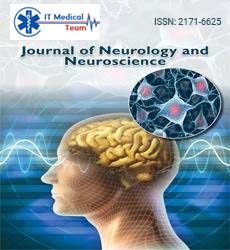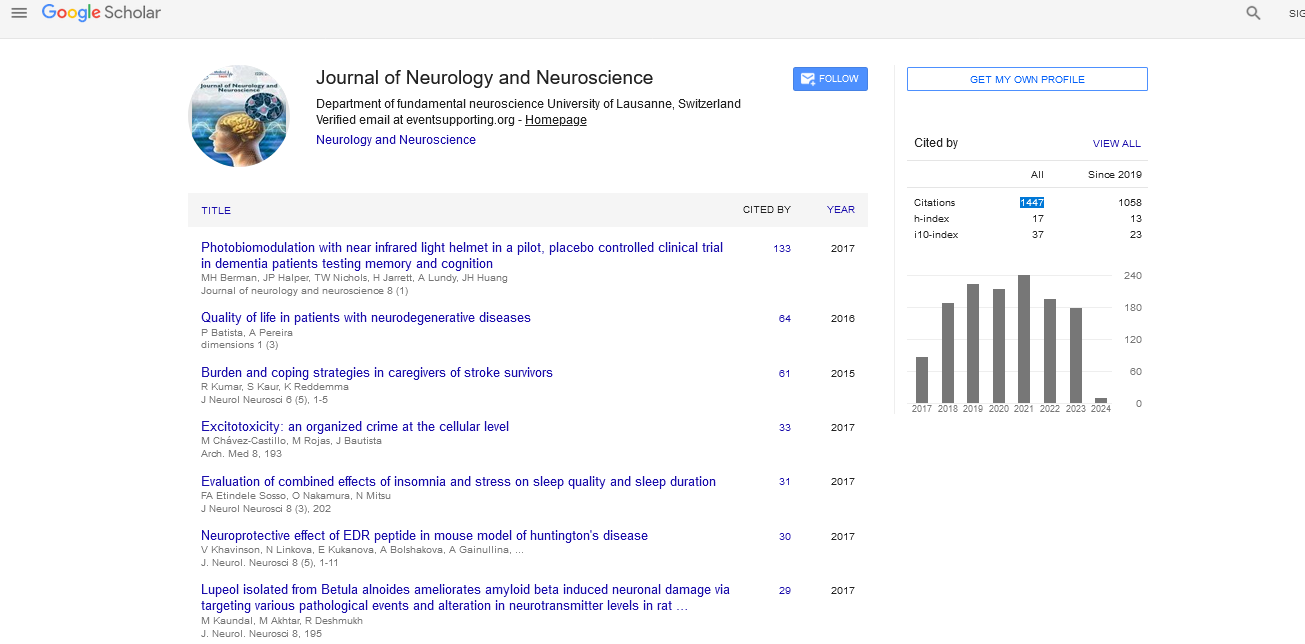Mini Review - (2023) Volume 14, Issue 4
The role of gut-brain axis in neurological disorders: Emerging insights
Olga Kovalchuk*
Department of Neurology, School of Medicine, Mersin University, Mersin 33110, Turkey
*Correspondence:
Olga Kovalchuk, Department of Neurology, School of Medicine, Mersin University, Mersin 33110,
Turkey,
Email:
Received: 01-Aug-2023, Manuscript No. ipjnn-23-14072;
Editor assigned: 03-Aug-2023, Pre QC No. P-14072;
Reviewed: 17-Aug-2023, QC No. Q-14072;
Revised: 23-Aug-2023, Manuscript No. R-14072;
Published:
31-Aug-2023
Abstract
The gut-brain axis, a complex bidirectional communication system between the gut and the central nervous system, has recently gained prominence in understanding the pathophysiology of various neurological disorders. This paper explores emerging insights into the role of the gut-brain axis in neurological conditions, shedding light on its impact on disease development and potential therapeutic avenues. We synthesize current research findings to provide a comprehensive overview of this evolving field and highlight its implications for future neurological disorder management.
Keywords
Gut-brain axis; Neurological disorders; Bidirectional
communication; Pathophysiology; Emerging insights; Disease
development; Therapeutic avenues; Neurology; Gut microbiota;
Enteric nervous system
Introduction
Neurological disorders encompass a broad spectrum
of conditions, including Alzheimer's disease, Parkinson's
disease, multiple sclerosis, and epilepsy, among others.
Recent research has uncovered a previously underappreciated
connection between the gut and the brain, known as the
gut-brain axis. This bidirectional communication system
involves the intricate interplay between the gut microbiota,
the enteric nervous system, and the central nervous system.
This paper explores the emerging insights into how the
gut-brain axis influences the pathophysiology of various
neurological disorders and offers new perspectives on
potential therapeutic interventions [1].
Literature Review
The description section of this paper delves into the
multifaceted components of the gut-brain axis, elucidating
how the gut microbiota composition can influence
neural function and vice versa. It discusses the role of
the enteric nervous system in mediating communication
between the gut and the brain and how disruptions in this
communication can contribute to the development and
progression of neurological disorders [2].
Furthermore, this paper explores the diverse
mechanisms through which the gut-brain axis impacts
neurological disorders, including neuroinflammation,
immune modulation, neurotransmitter production, and
the regulation of the blood-brain barrier. It also examines
the influence of dietary factors and lifestyle on the gut
microbiota and, consequently, their potential impact on
neurological health [3].
The description highlights specific neurological
disorders where the gut-brain axis has shown significant
relevance, providing case studies and evidence from clinical
and preclinical studies. It also discusses the diagnostic
potential of gut microbiota profiling and enteric nervous
system assessments in neurological disorder management [4].
Discussion
The discussion section critically evaluates the current
state of research on the gut-brain axis and its implications
for neurological disorders. It addresses the limitations and
challenges in studying this complex system, emphasizing
the need for multidisciplinary collaboration among
neuroscientists, gastroenterologists, and microbiologists.
Moreover, it explores potential therapeutic strategies targeting the gut-brain axis, such as dietary interventions,
probiotics, fecal microbiota transplantation, and
neuromodulation techniques. The discussion also considers
the ethical and safety considerations associated with these
interventions, highlighting the importance of personalized
approaches in treating neurological disorders [5,6].
Conclusion
In conclusion, the gut-brain axis represents a
fascinating frontier in neurology, with emerging insights
into its pivotal role in the pathophysiology of various
neurological disorders. As research continues to unravel the
intricate connections between gut microbiota, the enteric
nervous system, and the central nervous system, there is growing optimism for innovative therapeutic approaches.
Understanding and targeting the gut-brain axis holds
promise for improving the management and treatment
of neurological disorders, offering hope to millions of
individuals affected by these conditions. This evolving field
invites further exploration and collaboration to unlock its
full potential in neurological healthcare.
Acknowledgement
None.
Conflict of Interest
None.
References
- Brew BJ, Barnes SL. The impact of HIV central nervous system persistence on pathogenesis. Aids. 2019;33:113-121.
Google Scholar, Crossref, Indexed at
- Spudich S, Peterson J, Fuchs D, et al. Potential for early antiretroviral therapy to reduce central nervous system HIV-1 persistence. Aids. 2019;33:135-144.
Google Scholar, Crossref, Indexed at
- Farhadian SF, Lindenbaum O, Zhao J, et al. HIV viral transcription and immune perturbations in the CNS of people with HIV despite ART. JCI insight. 2022;7(13).
Google Scholar, Crossref, Indexed at
- Lustig G, Cele S, Karim F, et al. T cell derived HIV-1 is present in the CSF in the face of suppressive antiretroviral therapy. PLoS Pathogens. 2021;17(9):1009871.
Google Scholar, Crossref, Indexed at
- Saylor D, Dickens AM, Sacktor N, et al. HIV-associated neurocognitive disorder—pathogenesis and prospects for treatment. Nat Rev Neurosci. 2016;12(4):234-48.
Google Scholar, Crossref, Indexed at
- Rosenbaum PL, Livingston MH, Palisano RJ, et al. Quality of life and health‐related quality of life of adolescents with cerebral palsy. Dev Med Child Neurol. 2007;49(7):516-21.
Google Scholar, Crossref, Indexed at





